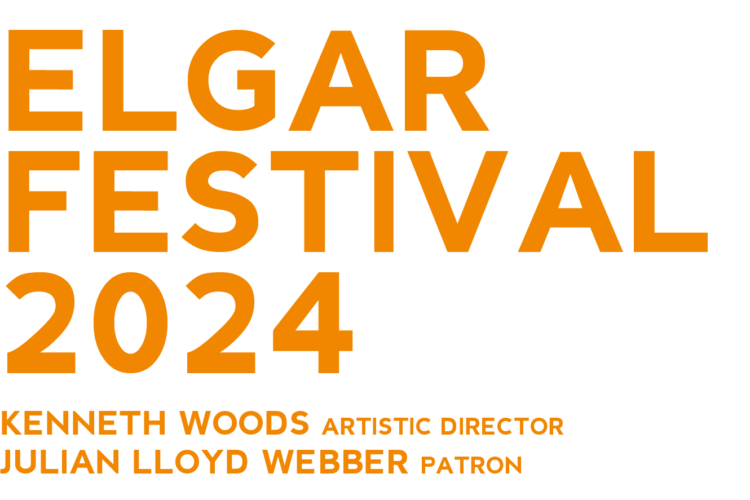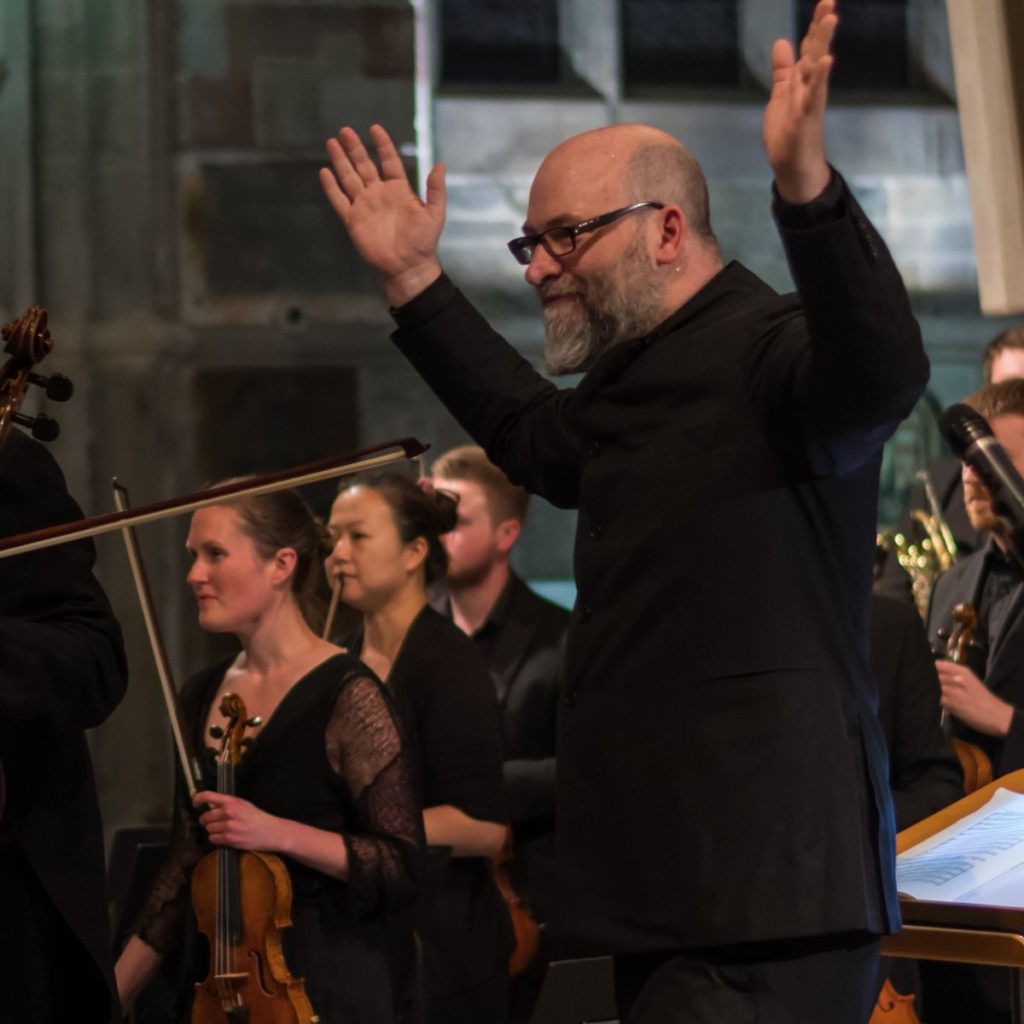
Photo caption: Kenneth Woods, Artistic Director of The Elgar Festival |
||||||
|
Hailed by Gramophone Magazine as ‘a symphonic conductor of stature’, American conductor Kenneth Woods was appointed Artistic Director and Principal Conductor of the English Symphony Orchestra in 2013, and has quickly built up an impressive and acclaimed body of work with them. Woods is also the Artistic Director of both the Colorado MahlerFest – the only US organisation other than the New York Philharmonic to receive the International Gustav Mahler Society’s Gold Medal – and the Elgar Festival in Worcester. We caught up with him to talk about all things Elgar, ahead of this year’s Festival which runs from Monday 27 May until Sunday 2 June. The Elgar Festival is now in its 6th year; as Artistic Director, what do you think its appeal is? Edward Elgar’s music is some of the most beloved and enduring music in the world; by celebrating his music, his life and his contributions to British culture in the city of his birth and the region in which he spent most of his life, the Festival is able to transcend being simply a musical event and to become a celebration of place, of history and of community. Community is particularly important to us. Our motto is Elgar for Everyone, and we really try to live by those words. Importantly, this isn’t a Festival that serves just hardcore classical music fans; our offer includes all kinds of music, free events, events for children and families, events for people living with health challenges and disabilities. We believe music is one of the strongest forces binding us as friends, neighbours and families. How did you get involved with it? Worcester City Council passed a resolution establishing something called Elgar Day and a number of local organisations and partners formed a working group to see what Elgar Day might mean. At some point, as the conductor of the English Symphony Orchestra, I was invited along, and after a few meetings I put my hand up and said something along the lines that what we really needed was an Elgar Festival – not an Elgar Day – and that I should probably be the one to lead it. I was expecting a chorus of “Are you crazy?”, but there was a somewhat encouraging sigh of relief, although one chap did storm out. We got straight to work, and a year later, in 2018, we had our first Festival. The rest, as they say, is history! In what ways do you think it has grown and developed since it first began? Any would be Artistic Director is like Dorothy in the Wizard of Oz. I can’t get where I need to go without the help of the friends I find on my journey. When we started, the Elgar Festival didn’t even exist as an official entity – we didn’t have a bank account, we weren’t a charity, we had no money. In the first year, the English Symphony Orchestra put the Festival on its shoulders, took the financial risk, paid for the printing and booked the venues. At the end of that first Gala concert, the wonderful Anne Renshaw – whose contributions to musical life in Worcester could fill a book – approached me and said she’d be willing to help develop the Festival for the following year. Over many coffees, we re-thought our mission, our branding, our motto, our vision. We decided that the Festival had to embrace the audiences and communities of today and tomorrow, not just to look back nostalgically at a bygone era. Elgar for Everyone was born. If Anne was my Scarecrow, we’ve since been joined by a wonderful team of Cowardly Lions and Tin Men. We’ve built the organisational framework and seen the Festival grow in both scope and quality. Quality was always our first concern. We were lucky that our first Festival in 2018 was a Critics Pick in the Guardian, and we’ve since been singled out as one of the country’s most important Festivals in the Telegraph and The Times. In 2022, the Guardian listed the Elgar Festival as one of the top 15 celebrations nationwide for the Royal Platinum Jubilee. This year, we appointed our first salaried member of staff, Sue Voysey, as our Executive Director. Sue is one of the best in the business. She’s held leading roles at The Hallé and the Broadway Arts Festival, and she’s brought tremendous expertise, energy and vision to the administration and development of the festival. With her arrival, I think the Emerald City is closer than ever! Nationwide arts funding cuts from The Arts Council are having a profound effect on the delivery of projects like The Elgar Festival; what has this impact had on the Festival and what are your concerns for the future of such events? It’s important to start by saying that Arts Council England has been a tremendous force for good in British cultural life for generations. No system is perfect, but The Elgar Festival wouldn’t be what it is today without the support ACE has given us in the past. That said, the climate is very difficult, and this year’s Festival will be getting 40 per cent less from ACE than last year. ACE is operating under really difficult funding restraints which have built up over more than a decade of stand-still revenues. But they’ve also made a number of strategic decisions to shift investment away from traditional artforms into community work, non-traditional artforms, urban renewal and social justice. All of these are worthwhile endeavours, but The Arts Council is the only official UK funder of the arts. They’re not the Community Council, or the Social Justice Council or the Community Engagement Council. Artists have nowhere else to turn, and when professional musicians are seeing their livelihoods crumble while large sums are going to pay utility bills at venues, it’s heartbreaking. I talk to colleagues at ACE all the time. The people I deal with are all passionate, committed and knowledgeable, but it’s pretty clear that the time has come for those at the highest levels at ACE to engage with artists and arts organisations, look at what has gone wrong in recent years and discuss openly and constructively about whether the current framework of goals, strategy and processes are working. There was a point this year where neither The English Symphony Orchestra nor The Elgar Festival had any ACE funding in place. ESO still doesn’t. These are two of the largest, most open classical organisations serving audiences and communities between Birmingham and Cardiff. Orchestras and opera companies all over the UK are balanced on a knife’s edge, one or two unsuccessful funding applications from disaster. Edward Elgar is Britain’s greatest and most famous composer. Every high school student in America graduates to the tune of Pomp and Circumstance. He and Shakespeare are our most enduring cultural exports. What would it say about our country if the Festival that bears his name, and the world class professional orchestra in his home city, were to disappear? What’s next? No Shakespeare in Stratford? No Mozart in Vienna? No Jimi Hendrix in Seattle? In an ideal world, where would you like the Festival to be in five years’ time? The growth of the festival has been very rapid, and I feel like our offer in Worcester is about the right size and scope for the city. In Worcester, we want to focus on building more of a resilient financial foundation. Arts organisations are at their most vibrant and secure when the local community has a real stake in their success. If the people of Worcester decide that they want to ensure the future of their Festival, there’s more than enough wealth and goodwill in our city to make it happen. And the more evidence we can show of local people, businesses and groups supporting the Festival in concrete ways, the stronger the case we can make to ACE and all the hundred or so trusts and foundations we go to every year. Legacy is important to us. In music, that means documenting our events, sharing our concerts and recordings online, commissioning new work, developing new artists. I’m really proud of the body of work we’ve built up so far, and in five years, I’m hoping it’s a legacy so rich and compelling that our contribution to British cultural life is so important that no funder could ever say no to it, and that all our local supporters can feel real pride and ownership in helping to identify and support the Elgar’s of tomorrow. Finally, we speak of this entire region as Elgar Country. We’d like to see the Festival celebrating more of the places that meant a lot to Elgar. I would hope we can look forward to concerts in Hereford and Birmingham, and to taking our chamber music and community work into the small villages and towns that Elgar loved so much. Any stand out moments from previous Festivals? What do you think the big hits will be this year? The first Festival was so touch and go! I felt much more like Professor Marvel behind the curtain than Dorothy at that point. Trying to make it look like we were a proper Festival when we had nothing! Somehow, the ESO musicians managed to deliver a really thrilling performance at that first Gala in spite of all the challenges. It’s because they rose to the challenge that we have a Festival today. Being part of the official 100th Anniversary performance of the Elgar Cello Concerto with Raphael Wallfisch had huge personal significance for me as a cellist. That piece has been so close to my heart since I discovered it as a young cellist in Wisconsin. I remember listening to the LP, reading the liner notes and imagining what those mystical Malvern Hills might look like. That life would take me on a journey to that moment remains kind of amazing to me. It was heartbreaking to abandon plans for the 2020 festival in the face of the Covid pandemic, but when we returned at last in October of 2021 with the Enigma Variations, it felt like the musicians really did unleash two years of pent up passion, virtuosity and excitement. Finally, doing Elgar’s First Symphony was another concert I’ll never forget. This year it’s got to be Steve Elcock’s music, particularly Wreck, which is an amazing piece, and the Elgar Violin Concerto with my dear friend Zoë Beyers, who is the ESO’s Leader and Principal Artist. Zoë is one of the best violinists on the planet, and she and I both share a deep, deep affinity for the Violin Concerto. It should be very special. For a full list of events, costs and booking information, please visit www.elgarfestival.org. Tickets are now on sale.
GoFundMe Campaign Like many arts-based charities, the Elgar Festival is raising money to help deliver its 2024 iteration. Donations help towards costs for Relaxed concerts, artist’s fees and instrument and venue hire, and help to keep the free events free for all. Further details can be found at: https://www.gofundme.com/f/elgar-festival-2024
|

